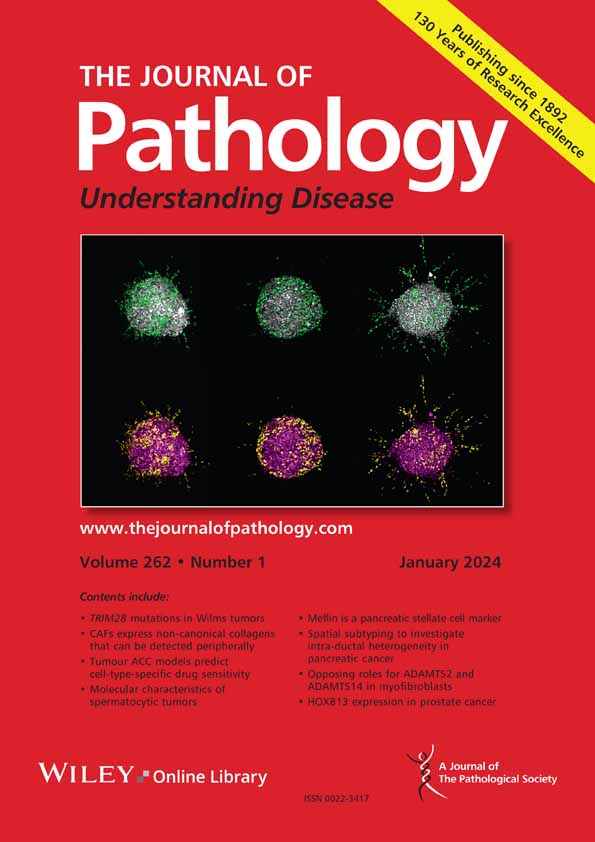Xunxi Lu, Zongchao Gou, Hong Chen, Li Li, Fei Chen, Chunjuan Bao, Hong Bu, Zhang Zhang
求助PDF
{"title":"Extracellular matrix cancer-associated fibroblasts promote stromal fibrosis and immune exclusion in triple-negative breast cancer","authors":"Xunxi Lu, Zongchao Gou, Hong Chen, Li Li, Fei Chen, Chunjuan Bao, Hong Bu, Zhang Zhang","doi":"10.1002/path.6395","DOIUrl":null,"url":null,"abstract":"<p>The impact of high heterogeneity of cancer-associated fibroblasts (CAFs) on triple-negative breast cancer (TNBC) immunotherapy response has not been fully elucidated, restricting progress in precision immuno-oncology. We integrated single-cell transcriptomic data from 18 TNBC patients and analyzed fibroblast subpopulations. Extracellular matrix CAFs (ecmCAFs) were identified as a fibroblast subpopulation with distinct ECM-associated characteristics. The ecmCAFs were significantly enriched in TNBC patients with residual disease after neoadjuvant immunotherapy and contributed to a fibrotic tumor microenvironment and T-cell exclusion. Secreted phosphoprotein 1 (<i>SPP1</i>) positive macrophages (SPP1<sup>+</sup> Mφs) were closely localized to ecmCAFs and produced more transforming growth factor beta (<i>TGFB1</i>), interleukin 1 beta (<i>IL1B</i>), and <i>SPP1</i> under hypoxic conditions. SPP1<sup>+</sup> Mφs were found to facilitate the differentiation of normal breast fibroblasts to ecmCAFs, thus promoting ECM remodeling and stromal fibrosis. Our work revealed the critical role of ecmCAFs in generating a desmoplastic architecture and driving immunosuppression in TNBC. © 2025 The Pathological Society of Great Britain and Ireland.</p>","PeriodicalId":232,"journal":{"name":"The Journal of Pathology","volume":"265 3","pages":"385-399"},"PeriodicalIF":5.2000,"publicationDate":"2025-01-23","publicationTypes":"Journal Article","fieldsOfStudy":null,"isOpenAccess":false,"openAccessPdf":"","citationCount":"0","resultStr":null,"platform":"Semanticscholar","paperid":null,"PeriodicalName":"The Journal of Pathology","FirstCategoryId":"3","ListUrlMain":"https://pathsocjournals.onlinelibrary.wiley.com/doi/10.1002/path.6395","RegionNum":2,"RegionCategory":"医学","ArticlePicture":[],"TitleCN":null,"AbstractTextCN":null,"PMCID":null,"EPubDate":"","PubModel":"","JCR":"Q1","JCRName":"ONCOLOGY","Score":null,"Total":0}
引用次数: 0
引用
批量引用
Abstract
The impact of high heterogeneity of cancer-associated fibroblasts (CAFs) on triple-negative breast cancer (TNBC) immunotherapy response has not been fully elucidated, restricting progress in precision immuno-oncology. We integrated single-cell transcriptomic data from 18 TNBC patients and analyzed fibroblast subpopulations. Extracellular matrix CAFs (ecmCAFs) were identified as a fibroblast subpopulation with distinct ECM-associated characteristics. The ecmCAFs were significantly enriched in TNBC patients with residual disease after neoadjuvant immunotherapy and contributed to a fibrotic tumor microenvironment and T-cell exclusion. Secreted phosphoprotein 1 (SPP1 ) positive macrophages (SPP1+ Mφs) were closely localized to ecmCAFs and produced more transforming growth factor beta (TGFB1 ), interleukin 1 beta (IL1B ), and SPP1 under hypoxic conditions. SPP1+ Mφs were found to facilitate the differentiation of normal breast fibroblasts to ecmCAFs, thus promoting ECM remodeling and stromal fibrosis. Our work revealed the critical role of ecmCAFs in generating a desmoplastic architecture and driving immunosuppression in TNBC. © 2025 The Pathological Society of Great Britain and Ireland.
细胞外基质癌相关成纤维细胞促进三阴性乳腺癌间质纤维化和免疫排斥。
癌症相关成纤维细胞(CAFs)的高异质性对三阴性乳腺癌(TNBC)免疫治疗反应的影响尚未完全阐明,限制了精确免疫肿瘤学的进展。我们整合了来自18名TNBC患者的单细胞转录组数据,并分析了成纤维细胞亚群。细胞外基质CAFs (ecmCAFs)被确定为具有不同ecm相关特征的成纤维细胞亚群。在新辅助免疫治疗后残留病变的TNBC患者中,ecmCAFs显著富集,并有助于纤维化肿瘤微环境和t细胞排斥。分泌磷酸化蛋白1 (SPP1)阳性的巨噬细胞(SPP1+ m - φs)与ecmCAFs紧密定位,在缺氧条件下产生更多的转化生长因子β (TGFB1)、白细胞介素1 β (IL1B)和SPP1。SPP1+ Mφs可促进正常乳腺成纤维细胞向ecmCAFs分化,从而促进ECM重塑和间质纤维化。我们的工作揭示了ecmCAFs在TNBC中产生结缔组织结构和驱动免疫抑制的关键作用。©2025英国和爱尔兰病理学会。
本文章由计算机程序翻译,如有差异,请以英文原文为准。





 求助内容:
求助内容: 应助结果提醒方式:
应助结果提醒方式:


